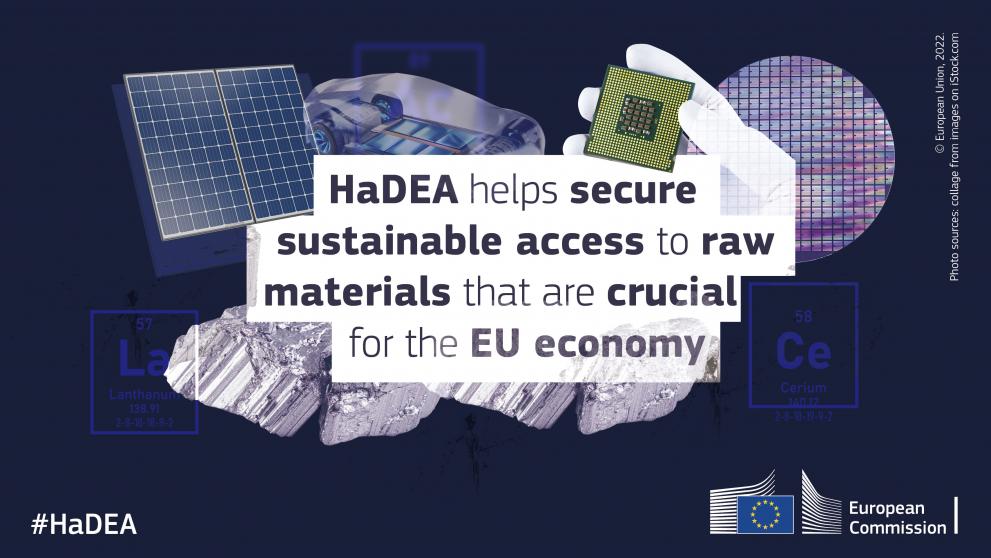
The EIT Raw Materials Summit, currently taking place in Berlin from 23-25 May, provides an overview of the European raw materials ecosystem and beyond, presenting the latest innovations, policy initiatives, and new bright start-ups from across the raw materials value chain.
This event is a remarkable opportunity to discuss the high importance for the EU economy of securing a sustainable access to raw materials such as metals, industrial minerals, construction and forest-based raw materials, and particularly Critical Raw Materials (CRM).
HaDEA contributes to the resilience and strategic autonomy of EU industry by implementing parts of Cluster 4 of Pillar II of Horizon Europe.
The challenges of the raw materials industry
The processing, reuse, recycling and recovery of raw materials can be very complex and resource-intensive.
Good news is that a solid number of novel raw materials production technologies is emerging. The challenge for the industry is to develop and scale up such promising technologies to demonstrate that raw materials, and especially CRMs, can be produced sustainably, and HaDEA is at the forefront in this respect.
The ultimate goal is to make sure that research and innovation find its way to the market to strengthen the competitiveness of the European raw materials sector, meet energy and climate targets for 2030 and minimise environmental impacts and risks.
Meet the projects
As one of the sessions of the event focuses on how to maximise the opportunities of a Circular Economy approach in the raw materials sector and increase its sustainability standards, meet some of the projects managed by HaDEA that are innovating the raw material sector:
- BlackCycle: the tyre industry is among those generating considerable amounts of waste, but has the potential to enter in a circular economy approach. Launched in May 2020, the BlackCycle project is working to enable a massive circular economy of tyres. This European project funded by Horizon 2020 is designing world-first processes to make new tyres from end-of-life tyres, as well as recycling them to produce high-technical second hand raw materials without any waste of resources. In addition to the environmental benefits, the project will contribute to the growth of the European tyre industry as the world leader of sustainable tyre production.
- ICEBERG: To embrace the EU circular economy strategy, the building industry must improve its waste management practices. Especially Construction and Demolition Waste (CDW) which, based on volume, is the largest waste stream in the EU. The objective of H2020 project ICEBERG is to create innovative tools and technologies to advance the industry’s uptake of the circular economy. The project will do so through the development of novel circular reverse logistics’ tools and high-value secondary raw materials production technologies to establish market confidence and acceptance of recycled End-of-Life building materials (EBM).
- WOOL2LOOP: Mineral wool (stone wool and glass wool) is a non-metallic inorganic fibrous product formed by spinning or drawing molten stone or silica and binding it with resins and oils. Widely used as form of insulation in the EU, it is generally not recycled at a building's end-of-life. The H2020 project WOOL2LOOP provides new smart demolition and sorting technologies to address this issue, combined with a novel analysis method for mineral wool waste that enables the separation of the material. These processes help revalorise mineral wool waste and create new ceramic or cement based building material (concrete, pavement slabs, building facade elements and acoustic panels).
Background information
Horizon 2020 (H2020) was the EU’s multiannual funding programme between 2014 and 2020. H2020 provided Research and Innovation (R&I) funding for multi-national collaboration projects as well as for individual researchers and SMEs via special funding instruments. Horizon 2020 has been replaced by the Horizon Europe Programme, which will run until 2027.
Useful links
Details
- Publication date
- 25 May 2022
- Author
- European Health and Digital Executive Agency
- Programme Sector
- Industry
- Programme
- Horizon Europe
- Horizon Europe Cluster 4: Industry
- Tags
- EUFunded
- Event
- Industrial research
- Innovation
- Raw material
